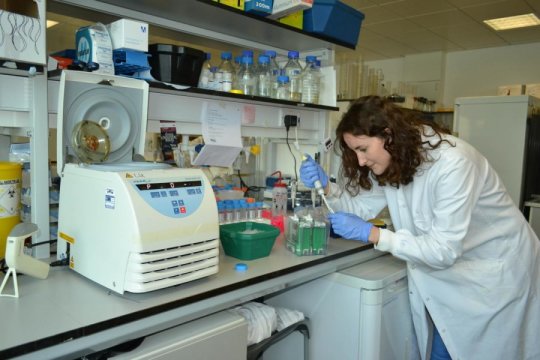Publishing online this week in Cell Host & Microbe, researchers at Johns Hopkins report the discovery of a key underlying immune mechanism that explains why to how our skin becomes inflamed from conditions such as atopic dermatitis, more commonly known as eczema. Toxin-producing bacteria on the surface of our skin induces a protein that causes our own cells to react and cause inflammation. “Our skin is covered with bacteria as part of our normal skin microbiome and typically serves as a barrier that protects us from infection and inflammation. However, when…
Read MoreCategory: Skincare
Psoriasis treated with compound derived from immune cells
A compound derived from immune cells treats psoriasis in mice and holds promise for other autoimmune diseases, according to a new study from Washington University School of Medicine in St. Louis. The compound suppresses an inflammatory pathway that is overactive in many autoimmune diseases, suggesting that it may be effective against multiple sclerosis, rheumatoid arthritis, lupus and other autoimmune diseases as well as psoriasis. “We are taking advantage of the body’s own anti-inflammatory power and showing that it can help in real situations when your own immune system is hurting…
Read MoreInsight into potential new strategy to target skin diseases like psoriasis
Research at UT Southwestern has shown that targeting metabolism in growing cells holds promise for the treatment of skin diseases like psoriasis that are characterized by skin overgrowth resulting from excess cell division, known as hyperproliferation. A research team led by Dr. Richard Wang, Assistant Professor of Dermatology, demonstrated in mice that inhibiting glucose transport may be a safe and effective treatment for these diseases. Actively dividing cells, like those underlying psoriasis, are more dependent on glucose for their growth. By inhibiting glucose transport in those cells, disease-associated skin overgrowth…
Read MoreSkin’s immune ‘alarm’ may explain light-induced rashes in lupus patients
Imagine being so sensitive to the sun’s rays that you’re forced to either slather yourself in sunscreen or risk a rash so severe it could leave permanent scars. This is the unfortunate reality of many people with lupus. Up to 60 percent of patients with the autoimmune disease has some degree of sensitivity to ultraviolet light — a condition called photosensitivity. It can result in skin inflammation or a flare-up of a wide-range of lupus symptoms, such as joint pain and fatigue. For some patients, even the light of a…
Read MoreHow our immune system detects broken DNA
Our immune system is working every day to protect us from bacteria, viruses, and parasites, but it can also detect when our own cells are damaged. Research led by Lancaster University has now discovered how skin cells alert the immune system, when their DNA is damaged in the absence of infection. This DNA damage can come from a variety of sources, such as the sun’s UV rays, chemical agents like cigarette smoke, or from genotoxic drugs used in chemotherapy. There have been few studies carried out on the immediate effects…
Read More
